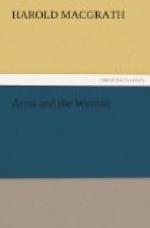With the following evening came the dinner; and I as a guest, a nervous, self-conscious guest, who started at every footstep. I was presented to the King, who eyed me curiously. Seeing that I wore a medal such as his Chancellor gives to men who sometimes do his country service, he spoke to me and inquired how I had obtained it. It was an affair similar to the Balkistan; only there was not an army, but a mob. The Princess was enchanting. I grew reckless, and let her read my eyes more than once; but she pretended not to see what was in them. At dinner a toast was given to his Majesty. It was made with those steins I showed you, Jack.
The Princess said softly to me, kissing the rim of the stein she held: “My toast is not to the King, but to the gentleman!” I had both steins bundled up and left with the host, together with my address.
It was not long after that the eventful moment for our flight arrived. I knew that I was basely to abuse the hospitality of the King. But what is a King to a man in love? Presently we two were alone in the garden, the Princess and myself. She was whispering instructions, telling me that I was a man of courage.
“It is not too late to back out,” she said.
“I would face a thousand kings rather,” I replied.
We could see at the gate the carriage which was to take us to the station. Now came the moment when I was tried by the crucible and found to be dross. I committed the most foolish blunder of my life. My love suddenly overleapt its bounds. In a moment my arms were around her lithe body; my lips met hers squarely. After it was done she stood very still, as if incapable of understanding my offence. But I understood. I was overwhelmed with remorse, love, and regret. I had made impossible what might have been.
“Your Highness,” I cried, “I could not help it! Before God I could not! It is because I love you better than anything in the world—you cannot be of it!—and all this is impossible, this going away together.”
Her bosom heaved, and her eyes flashed like a heated summer sky.
“I will give you one minute to leave this place,” she said, her tones as even and as cold as sudden repression of wrath could make them. “I trusted you, and you have dared to take advantage of what seemed my helplessness. It is well indeed for you that you committed this outrage before it is too late. I should have killed you then. I might have known. Could ever a woman trust a man?” She laughed contemptuously. “You would have made me a thing of scorn; and I trusted you!”
“As God is my judge,” I cried, “my respect for you is as high as heaven itself. I love you; is there nothing in that? I am but human. I am not a stone image. And you have tempted me beyond all control. Pardon what I have done; it was not the want of respect—.”
“Spare me your protestations. I believe your minute is nearly gone,” she interrupted.




